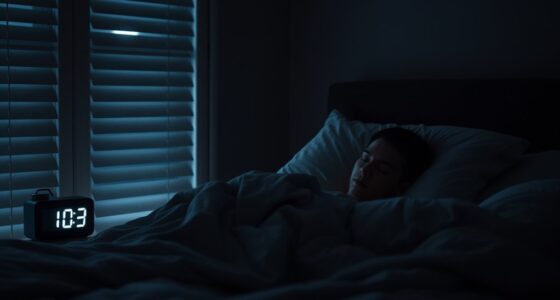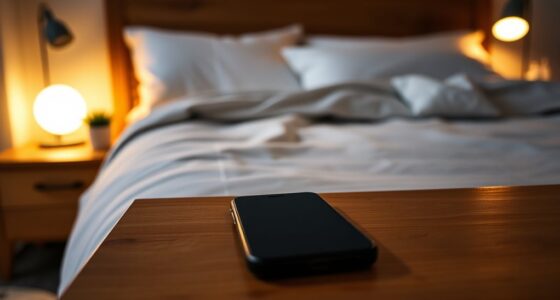Orthosomnia happens when your obsession with sleep tracking turns into anxiety, making it harder to rest. You may focus too much on sleep data, worry about every disruption, and become hyper-aware of your sleep patterns. This anxiety can worsen sleep quality rather than improve it. If you keep tracking obsessively, you risk developing sleep-related stress. To understand how to break free from this cycle, there’s more to contemplate that can help you regain control.
Key Takeaways
- Orthosomnia is a sleep disorder characterized by anxiety and obsession over sleep quality, often driven by sleep tracking devices.
- Excessive reliance on sleep data can increase stress, leading to poorer sleep and heightened sleep-related anxiety.
- Inaccurate or misinterpreted sleep metrics may cause unnecessary worry and reinforce obsessive behaviors.
- Sleep trackers can turn sleep into a source of stress, disrupting natural sleep patterns and fostering hyper-awareness.
- Professional medical advice should complement sleep tracking to prevent or address orthosomnia effectively.
If you’re obsessed with tracking your sleep, you’re not alone; many people turn to sleep devices and apps hoping to improve their rest. While these tools can offer valuable insights, they can also lead to unintended consequences when taken to the extreme. One significant concern is the behavioral impact that constant monitoring can have. When you rely heavily on sleep trackers, you might find yourself becoming anxious about every little disruption or variation in your sleep patterns. This obsession can cause you to focus more on data than actual rest, creating a cycle of stress that worsens your sleep quality rather than improves it. Instead of feeling rested and rejuvenated, you might start feeling increasingly worried about your sleep duration or quality, which ironically makes it harder to fall asleep or stay asleep.
A key factor in this cycle is technological accuracy. Many sleep tracking devices and apps claim to provide detailed data about your sleep stages, duration, and even sleep efficiency. However, their accuracy isn’t always reliable. While some gadgets use sophisticated sensors, they often rely on algorithms that interpret movement or heart rate, which can be misleading. For example, a device might register movement as wakefulness when you’re simply turning over, or it might not detect light sleep stages accurately. When you place too much trust in these measurements, it can distort your understanding of your sleep health. If you see reports suggesting poor sleep quality, you might start to worry excessively, even if your actual rest is sufficient. Conversely, overconfidence in inaccurate data can lead you to dismiss genuine sleep issues, delaying necessary medical intervention.
This reliance on technology can also alter your behavior in unexpected ways. You might become compulsive about going to bed at the same time every night or checking your sleep data repeatedly, fostering a sense of control that’s actually counterproductive. The obsession can cause you to become hyper-aware of sleep, turning what should be a natural, restorative process into a source of stress. Over time, this can develop into orthosomnia—an anxiety-driven disorder where you’re constantly concerned about achieving “perfect” sleep. Ultimately, while sleep trackers can be helpful tools, they shouldn’t replace a balanced perspective or professional advice. Recognizing their limitations and understanding how they influence your behavior is essential to prevent sleep monitoring from turning into a source of anxiety rather than a helpful guide. Additionally, incorporating AI security measures can help protect your personal sleep data from breaches and unauthorized access.
Frequently Asked Questions
Can Orthosomnia Affect Mental Health Long-Term?
Yes, orthosomnia can affect your mental health long-term. You might develop sleep anxiety, constantly worrying about your sleep quality. Obsessive monitoring of sleep data can increase stress and make it harder to relax, creating a vicious cycle. Over time, this persistent focus on perfect sleep can lead to feelings of frustration, low self-esteem, and even depression, impacting your overall well-being.
Are There Specific Sleep Trackers More Prone to Causing Orthosomnia?
Certain sleep trackers are more prone to causing orthosomnia because of their device accuracy and the way you interpret data. Devices with overly detailed or inconsistent readings can lead you to obsess over every sleep cycle. If you tend to check your data obsessively or trust inaccurate metrics, you’re more likely to develop orthosomnia. Be mindful of how you use sleep trackers and avoid overanalyzing their data to prevent obsession.
How Common Is Orthosomnia Among Different Age Groups?
Many age groups grapple with orthosomnia, with prevalence often rising among tech-savvy teens and stressed-out seniors. Technological factors like constant notifications and inaccurate data can trigger obsession across ages. Younger users may obsess over every sleep slip, while older adults might feel anxious about health implications. Overall, the obsession varies, but increased tech use tends to intensify orthosomnia’s hold, regardless of age.
Can Orthosomnia Be Cured Without Therapy?
Yes, you can often improve orthosomnia without therapy by focusing on better sleep hygiene. Try establishing a consistent sleep schedule, avoiding screens before bed, and practicing relaxation techniques. Doing a digital detox helps reduce anxiety caused by sleep tracking devices. These habits can ease your obsession, promote healthier sleep patterns, and restore your confidence in natural sleep, making therapy unnecessary in many cases.
What Are the Early Signs of Orthosomnia?
You might notice early signs of orthosomnia if you’re obsessively checking sleep quality data every night, feeling anxious when results don’t meet your standards. For example, you may become fixated on minor sleep disruptions, leading to restless nights and obsessive behaviors around sleep routines. These signs often indicate your focus is shifting from restful sleep to perfectionism, which can worsen sleep issues and create a cycle of anxiety and poor sleep.
Conclusion
Just like Icarus flying too close to the sun, obsessing over sleep data can lead you astray. Instead of chasing perfect nights, remember the wisdom of the tortoise—steady and mindful. Embrace your natural rhythms and trust your body’s signals. Sleep isn’t a race or a test; it’s a gentle journey. Let go of perfection, and you might just find the restful night your soul truly needs.








